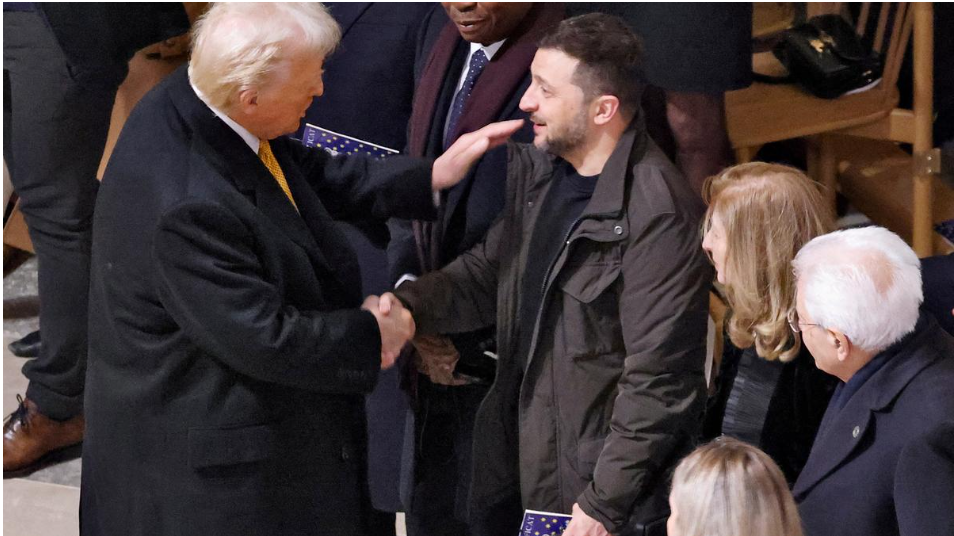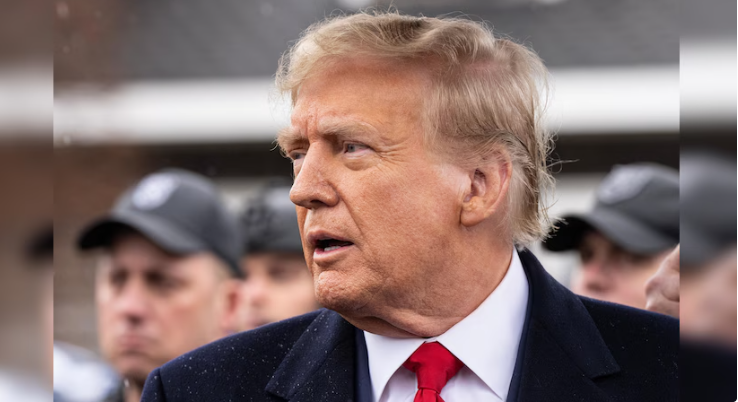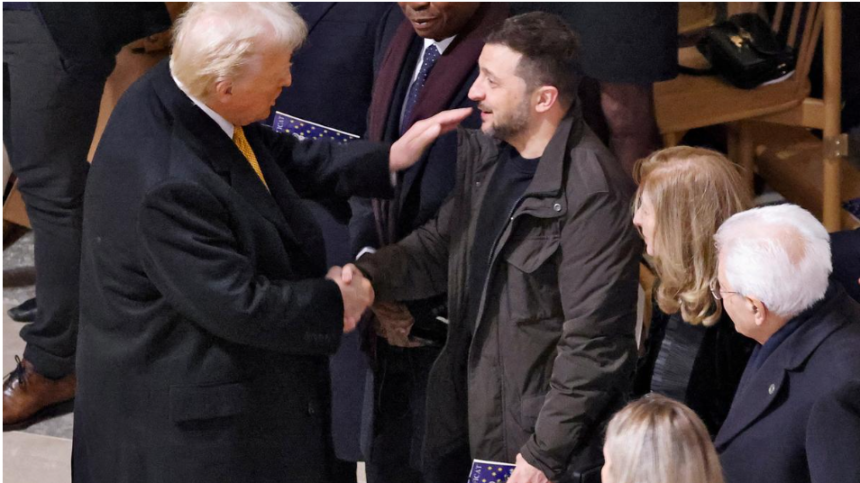Introduction
West Asia Former U.S. President and 2024 President-elect Donald Trump made a bold assertion during a diplomatic visit to France, declaring the Ukraine crisis a “bigger priority” for global stability compared to the escalating conflict in West Asia. Meeting with Ukrainian President Volodymyr Zelenskyy, Trump emphasized the urgent need to resolve the war between Ukraine and Russia, describing the scale of human loss and geopolitical ramifications as unparalleled.
In contrast, Trump downplayed the complexities of the Gaza war, asserting that it represented a “less difficult situation.” He also indicated a shift in the U.S. role in the Middle East, particularly in Syria, suggesting that the region should shoulder its own burdens. Trump’s comments reflect his evolving foreign policy stance and have sparked a wave of debate among analysts, diplomats, and global leaders.  For the more information click on this link
For the more information click on this link
Trump’s Meeting with Zelenskyy
The meeting between Trump and Zelenskyy in Paris marked a significant moment in U.S.-Ukraine relations. Trump expressed solidarity with Ukraine, which has been battling Russian aggression since 2022. Speaking at a joint press conference, Trump underscored the human cost of the war.
“Russia and Ukraine are losing thousands of soldiers every month,” Trump said, highlighting the devastating toll of the ongoing conflict. “This war has gone on for too long, and it is time for decisive action to end it.”
Zelenskyy, in turn, welcomed Trump’s commitment to prioritizing the conflict and called for continued U.S. support, particularly in the form of military aid and economic assistance. While details of their private discussions remain undisclosed, sources suggest that Zelenskyy urged Trump to maintain bipartisan support for Ukraine and to push for stronger sanctions on Russia.
The Ukraine Crisis: A Global Priority
Trump’s emphasis on Ukraine stems from several key considerations:
- Scale of the Conflict: The war in Ukraine has caused tens of thousands of casualties, displaced millions, and devastated critical infrastructure. The conflict has also disrupted global food supplies and energy markets, with ripple effects felt worldwide.
- Geopolitical Stakes: The Ukraine war represents a broader struggle between Western democracies and authoritarian regimes. Trump framed the conflict as central to preserving the international order and deterring further aggression by Russia.
- European Security: Trump emphasized the implications of the war for NATO and European stability, arguing that a prolonged conflict risks emboldening other adversaries.
A Shift in Focus from West Asia
While recognizing the significance of the Gaza war, Trump characterized it as a “less difficult situation” compared to Ukraine. He argued that the Middle East conflicts, while tragic, West Asia are localized and manageable with regional solutions.
“We have allies in West Asia who are more than capable of taking the lead,” Trump said, West Asia pointing to Israel’s military strength and the regional influence of Egypt and Saudi Arabia.
The Gaza War: Trump’s Take
Trump’s comments on the Gaza conflict have drawn criticism for downplaying its complexity. The war between Israel and Hamas, sparked by the October 7 attacks, has resulted in a severe humanitarian crisis, with thousands of Palestinian civilians killed and millions displaced. Despite this, West Asia Trump suggested that the fallout was less severe than the global disruptions caused by the Ukraine war.
Analysts interpret Trump’s remarks as signaling a pivot in U.S. Middle East policy. During his presidency, Trump prioritized Israel’s security, brokering the Abraham Accords to normalize relations between Israel and several Arab nations. His recent statements suggest a belief that these foundations can allow regional actors to address the crisis independently.
Syria “Will Have to Take Care of Itself”
Another striking aspect of Trump’s remarks was his stance on Syria. As violence and instability persist in the war-torn nation, Trump asserted that the U.S. should avoid further entanglement.
“We’ve spent decades in the Middle East with little to show for it,” West Asia he said. “Syria will have to take care of itself.”
This aligns with Trump’s long-standing belief in reducing U.S. military involvement abroad, a cornerstone of his “America First” policy. During his first term, Trump ordered the withdrawal of U.S. troops from northern Syria, a move that drew criticism for creating a power vacuum exploited by Turkey and Russia.
Criticism and Support
Trump’s comments have sparked a polarizing reaction:
- Supporters: Advocates of Trump’s approach argue that focusing on Ukraine aligns with U.S. strategic interests, particularly in countering Russian aggression and protecting NATO allies. They also support his push for regional self-reliance in the Middle East.
- Critics: Opponents accuse Trump of underestimating the complexities of the Gaza war and abandoning vulnerable populations in Syria. They argue that the U.S. risks losing its leadership role in the Middle East, creating opportunities for rival powers like Iran and Russia.
International Reactions
European Allies
European leaders welcomed Trump’s prioritization of Ukraine but urged caution in scaling back U.S. involvement in the Middle East. French President Emmanuel Macron, hosting Trump’s visit, West Asia emphasized the interconnectedness of global crises.
“We cannot afford to address one conflict at the expense of another,” Macron said, underscoring the importance of maintaining U.S. engagement in both regions.
Middle Eastern Leaders
Reactions from Middle Eastern capitals were mixed. Israeli officials welcomed Trump’s endorsement of Israel’s capacity to manage the Gaza war but expressed concern over his remarks on Syria, fearing further destabilization.
In contrast, leaders in Syria and Iran interpreted Trump’s statements as an opportunity to consolidate their influence in the region.
The Biden Administration’s Legacy
Trump’s critique of the Ukraine crisis echoes his broader opposition to the Biden administration’s foreign policy. While Biden secured bipartisan support for Ukraine, West Asia Trump has criticized the administration for failing to expedite peace talks.
Trump also used the opportunity to contrast his approach with Biden’s handling of the Middle East, West Asia claiming that the Gaza crisis escalated due to Biden’s “weak leadership.”
Balancing Two Crises
Experts argue that Trump’s prioritization of Ukraine over West Asia reflects a broader challenge for U.S. foreign policy: managing multiple global crises simultaneously. With limited resources and political capital, West Asia Washington faces difficult choices in allocating attention and aid.
Key questions include:
- How to Sustain Support for Ukraine: Ensuring continued bipartisan backing for Ukraine as domestic concerns, such as inflation, compete for attention.
- Balancing Middle Eastern Stability: Maintaining credibility with allies in West Asia while encouraging regional solutions to conflicts.
- Global Leadership: Preserving the U.S.’s role as a global leader in resolving crises and upholding international norms.
 For the more information click on this link
For the more information click on this link
Potential Policy Implications
Trump’s comments signal several potential shifts in U.S. foreign policy:
- Increased Pressure on Europe: Trump may push NATO allies to take greater responsibility for Ukraine, consistent with his past calls for burden-sharing.
- Reduced U.S. Engagement in the Middle East: A focus on regional self-reliance could reshape U.S. relations with traditional allies like Israel and Saudi Arabia.
- Focus on Negotiations: Trump has hinted at a desire to broker peace talks in Ukraine, leveraging his reputation as a dealmaker.
Conclusion
Donald Trump’s assertion that the Ukraine crisis is a “bigger priority” than the Gaza war reflects his foreign policy philosophy of prioritizing direct U.S. interests and encouraging regional self-reliance. His statements have reignited debates about America’s global role and its capacity to manage simultaneous crises.
As Trump prepares to re-enter the White House, his approach to Ukraine and West Asia will shape the trajectory of U.S. foreign policy and its relationships with allies and adversaries alike. Whether his strategies can resolve these complex challenges or exacerbate global tensions remains to be seen. ALSO READ:-South Korean Police Blocked from Raiding President Yoon’s Office: A Political Crisis Unfolds 2024





